I love coconut water! When I’m traveling in the tropics, there is nothing better than drinking water straight from a coconut. Mother nature designed the perfect vessel for a drink that is so refreshing, slightly sweet, and keeps you hydrated in hot climates. You’ve probably heard that coconut water makes an excellent hydrating drink that replenishes electrolytes and can replace nasty chemical-filled Gatorade and Powerade – but there really is more to it than that. How do you buy the healthiest coconut water and avoid the worst?
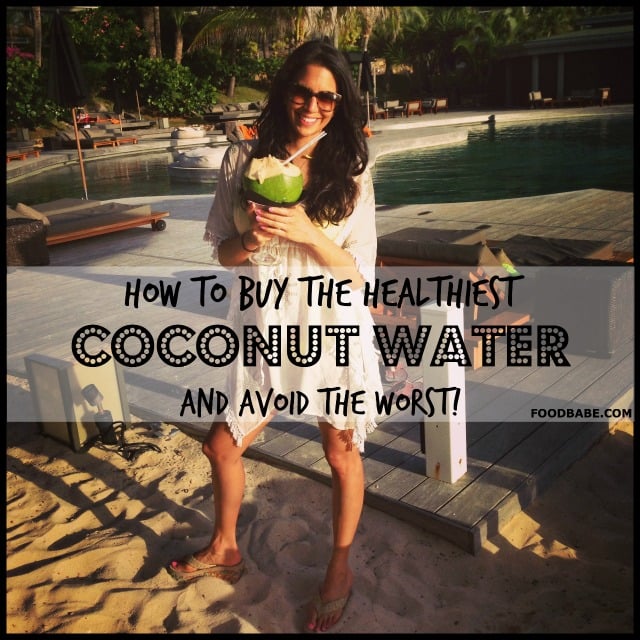
Coconut water is one of the healthiest drinks on the planet
Coconut water contains a unique combination of B vitamins, vitamin C, micronutrients, and phytohormones that are exceptionally beneficial to your health. A scientific review of coconut water, published in the journal Molecules, highlights some of the ways that coconut water replenishes your body:
- Helps to prevent heart attacks
- Lowers high blood pressure
- Can have anti-aging effects
- Fights free radicals to help prevent cancer
- Contains trans-zeatin which can be used to treat Alzheimer’s disease or dementia
That being said, I don’t want you to think it’s okay to pick up just any coconut water off of the shelf. Packaged coconut water is really flooding into the market recently. You can find it in bottles, cartons or powdered, frozen, flavored, carbonated, and sweetened. With all these choices it can be confusing and difficult to know if you are choosing the best one.
It usually costs at least $3 bucks a bottle, so it’s not exactly affordable- and if I’m going to spend my hard earned money on some, I make sure it’s worth it! Primarily, I look for coconut water that is the least processed and still has the majority of its nutrients intact. This is always going to be directly from a fresh coconut – but, of course that’s not always available. If you haven’t already heard, Pepsico and Coca-Cola have their own versions of coconut water – (O.N.E., Zico, Naked) – and you can only imagine what the corporations have done to it.
How To Ruin Coconut Water
Using a concentrate instead of fresh juice: Some coconut water companies get away with saying their drinks contain “100% Coconut Water” that’s “All Natural” even though it’s made from a reconstituted concentrate. Just like other juices in the store, they heat fresh coconut water and reduce it to a syrup. It’s cheaper for them to import this coconut water syrup, which they later add water prior to packaging. Any juice that has been heated to this extent loses a significant amount of its nutrients and its beneficial enzymes are denatured (i.e. the enzymes don’t work anymore).
Taking water from mature coconuts: This is a biggie. Young coconuts on the tree are usually green with an abundance of water in the center that is full of nutrients. Anyone that drinks coconut water straight from a coconut is drinking out of one of these young coconuts. As they begin to age, the nutrients in the water begin to seep into the meat of the coconut, and the water becomes less nutritious. It’s essentially watered-down. This also happens when young coconuts are picked and allowed to lie on the ground in the sun, for an extended period of time. While older “mature” coconuts might be used to make coconut oil, coconut milk and other coconut products, the coconut water from older coconuts is often discarded because it’s lacking nutrients and doesn’t taste the same. As the popularity in coconut water spiked recently, companies realized that they could buy up the water from mature coconuts and could get it cheaper than young coconut water. This is why it’s important to drink young coconut water and not get scammed into drinking the watered-down and less nutritious version.
Adding “natural flavors” or sweeteners: Young coconut water is refreshing and sweet, so there is absolutely no need to flavor or sweeten it – unless you are trying to hide something. Guess what happens when they use mature coconuts for their water? It tastes acidic, so they mask this taste with natural flavors or sweeten it up with sugars. I’ve heard that some companies use a centrifuge system to remove the acidic taste, but it’s a safe assumption that if you see a plain coconut water on the shelf with any natural flavors or sweeteners added it is from mature coconuts and not worth your money.
Pasteurizing it with heat: Coconut water is very delicate, naturally perishable, and should be kept cold. Have you ever stopped to wonder why most bottled and boxed coconut waters on the shelves aren’t in the refrigerated section? I recently checked out one of these bottles and noticed it didn’t expire for 2 years! This is because most coconut water at the store is heat pasteurized, which literally means that it’s been cooked to a very high temperature to kill bacteria and extend its shelf life. It has been shown that heat also destroys some of the vitamins, minerals, and phytonutrients and also denatures enzymes – stripping its benefits and much of its flavor. If coconut water is from concentrate, this would be the second time it’s heated. Obviously, your best bet is to seek out and find unpasteurized raw coconut water. This can be hard to find, but there is another way to kill bacteria while keeping the nutrients intact: HPP (high pressure processing). Without using heat, HPP is best way to preserve the goodness in coconut water, while extending its shelf life a little to make it more available commercially.
Dipping whole coconuts in formaldehyde or sodium metabisulphite: It’s been reported that some non-organic coconuts may be preserved for transport to the U.S. by dipping them in chemicals, including formaldehyde a known carcinogen. This leads to the possibility that these chemicals seep into the coconut meat and poisons the water. Some of my favorite organic cafes avoid this by getting frozen coconut water shipped directly to them.
We called up several of the most popular coconut water companies and asked where they source their coconuts (young vs. mature), if they dip them in chemicals, how they pasteurize them, and about additives and preservatives that they may use. We got a variety of responses, and it’s almost surprising to me how much some of these companies have screwed up something as basic as coconut water. I found several brands to avoid, because they are so heavily processed that the final product barely resembles natural coconut water.
Coconut waters to avoid at all costs:
Naked Juice Coconut Water – Although it’s not from concentrate, Naked told me that they use “mature” coconut water that is flash pasteurized with heat. The plain variety doesn’t have any additives, but all of the flavored ones have added natural flavors. This is also a Pepsico brand – a company that spent over $4 Million dollars to fight GMO labels – so they aren’t getting any of my business.
O.N.E. Coconut Water – This is another Pepsico brand that is flash pasteurized with heat. The flavored waters “with a Splash of Fruit Juice” contain natural flavors and “sugar” as an ingredient. As it doesn’t say “cane sugar” on the label, this could very well be from GMO sugar beets.
Pepsico told me that they couldn’t confirm whether their sugar is GMO because:
“the exact source of the sugar in our coconut water cannot be confirmed because we source our ingredients from around the world and that information is not available at this time. Please know that all of our products comply with all applicable food laws and labeling requirements. O.N.E. Coconut Water relies on the regulatory agencies charged with safeguarding our food supply when sourcing ingredients for our products”.
They are relying on the FDA’s regulations to protect us, although the FDA themselves say that the manufacturer is responsible for ensuring the safety of the ingredients used in their products, including GMOs.
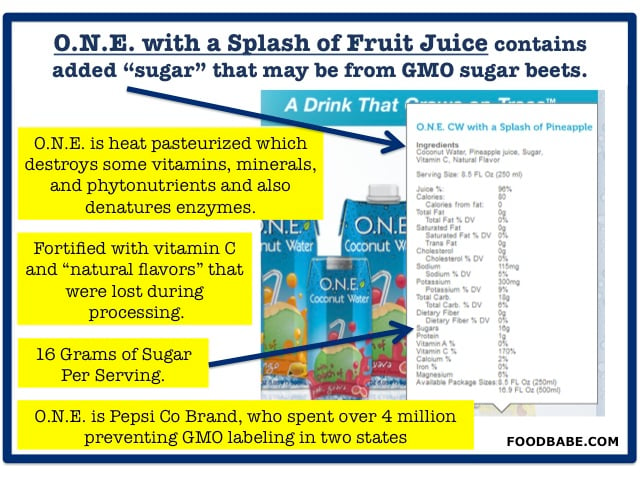
Zico – They sell two entirely different coconut waters depending on which packaging you choose. The waters in the bottles are made from concentrate and are a “blend of Asian coconuts” with natural flavors added. On the other hand, the ones in the tetra-pak cartons are not made from concentrate, have no additives, and contain only Thai coconut water that is packaged in Thailand. A bit confusing, isn’t it? While the tetra-paks (boxed) seem like a good choice, they use “Ultra High Temperature Pasteurization” to give it a long shelf life. This means it’s heated well above boiling point to 280 degrees Fahrenheit, which “kills everything” according to Scientific American, including beneficial nutrients. Plus, in case you didn’t hear the news, they were recently acquired by Coca-Cola – a big supporter of GMOs who have spent over 3.2 million to prevent GMO labeling.
CocoZona – We called and emailed them on several occasions, and they never replied to any of our questions – not even a peep! I always find it alarming when a company refuses to stand behind their product and isn’t transparent about their practices, especially since some companies have been caught lying about what’s really in the bottle. So, at this point, we know little more than what’s printed on the bottle of CocoZona, and the ingredient list reveals that it is made from concentrate. That’s enough reason to stay away from it.
Vita Coco – Don’t be fooled by all of those celebrity endorsements! Their waters are not made from concentrate, but they are all pasteurized with heat. Many of the flavored versions contain added sweeteners and the Cafe versions contain carrageenan. Even the seemingly plain 100% pure version contains added “fruit sugar.” Watch out for their coconut waters targeting kids, which are loaded with added sugar and many different natural flavors – they are not 100% coconut water! According to their website, Vita Coco Kids is also ultra high temperature pasteurized.
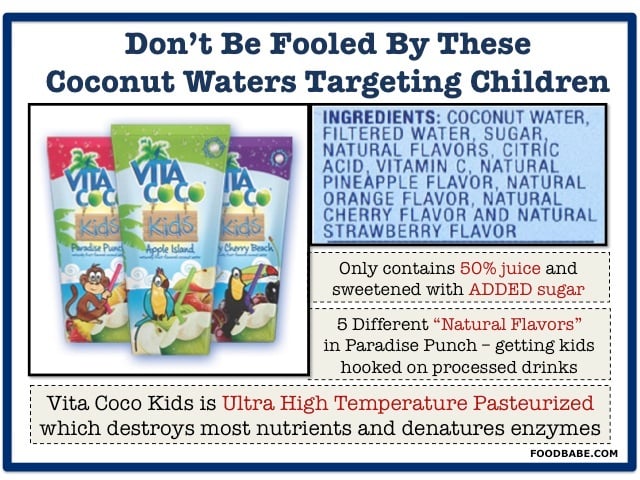
GOYA – This brand is heat pasteurized and contains added preservatives. Some versions are sweetened with sugar, which may be GMO. Because I vote with my dollars, I avoid any GOYA brand product as they spent over $56K to fight GMO labeling in California.
C2O – They told me they heat pasteurize their water up to 120 degrees celsius once the product is in the can for as long as 5 minutes. Although, they use no additives or concentrates, the length of this high heat processing puts it squarely on my avoid list.
Purity Organic – It’s made from concentrate and flash pasteurized with heat, so some of the goodness has been destroyed. It’s organic I know, but not all organic products use the best practices!
Coco Libre (Organic) – It’s made from concentrate, flash pasteurized with heat and has added “natural flavors.”
How do other popular coconut waters stack up?
Munkijo (organic) – This water isn’t from concentrate, contains no additives or added sugars and their young coconuts are sustainably grown and harvested. But I’m sorry to report they also use ultra high heat pasteurization to process their waters, so it’s far from the best on the market.
Coco Hydro by Big Tree Farms (organic) – I really like Big Tree Farms’ mission geared towards sustainability. Their unique version of coconut water is powdered and comes in packets that travel easily. So, there is no pasteurization involved, you just add water to reconstitute it. However, the process they use to evaporate the water uses heat, so it is not considered raw and some of the nutrients may be destroyed in the process.
Taste Nirvana (organic) – No concentrates or additives in this brand, and their young coconuts are sustainably grown, harvested and organic (though not labeled as such). I really like how it’s packaged in glass bottles. They are the only company that told me they use a “steam sterilization” process which is a combination of steam and pressure.
Amy & Brian (organic) – Other than the fact that they flash pasteurize the water, all other aspects are good – no additives, no added sugars, no concentrates. They also told me that their young coconuts are not treated with any chemicals or pesticides. I have to admit though, I’m not a fan of the cans they are in, even if they are BPA-free.
Harvest Bay (some varieties are certified organic) – They flash pasteurize their water for about 2 seconds at 120 degrees, and it’s not from concentrate. Some of their waters are now organic, and they are all non-GMO project verified. Although they add no sugars or additives to their plain version, most flavored varieties contain added sugar or natural flavors, so I’d avoid those.
Whole Foods 365 – They confirmed they don’t use a concentrate, however they heat pasteurize their water which comes “from around the world depending on availability”. Their water is also packaged in cans, which I don’t like!
Trader Joe’s – Their water is not from concentrate, but it is pasteurized. I have yet to hear back from them in regards to how they pasteurize their water (whether they use flash or ultra processing). They fortify their water with added vitamin C, which is a red flag that it has been heavily processed.
My top picks for packaged coconut water:
***This chart contains examples of the coconut waters we researched, however, there are many more available on the market or may be available in your neck of the woods. Please use this post as a guide to find the best coconut water in your area.***
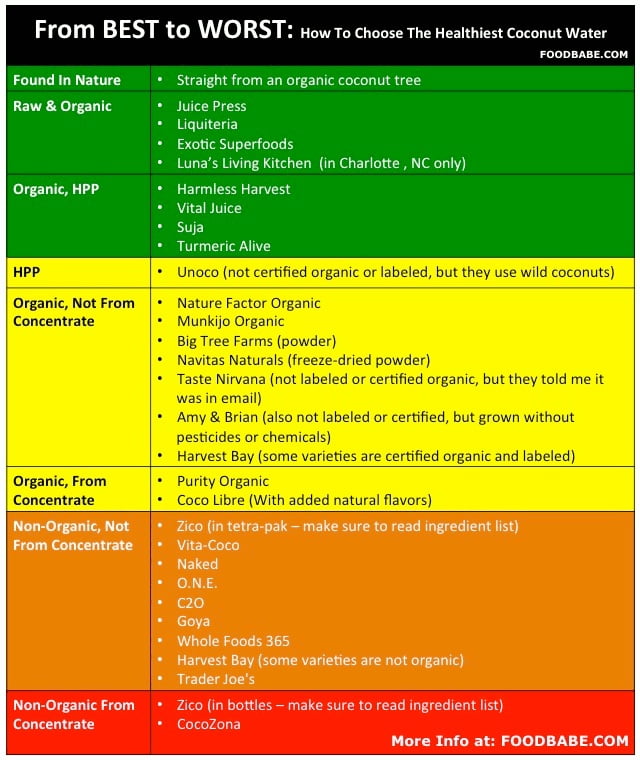
While the best coconut water is straight from a young coconut picked from a tree, these packaged waters below are as close to the real thing as you can get. They don’t use any heat processing or concentrates, so they aren’t cooking your coconut water. Some of them use HPP to kill bacteria, and a couple of these brands serve it up completely raw and unpasteurized.
Harmless Harvest (organic) – I’ve written about this brand before, and it’s no secret that they are my favorite. I had the pleasure of meeting with the founders of Harmless Harvest and I’m blown away with how open and honest they are about everything. They’ve become a success not because of marketing, but because of their good practices. In fact, they hardly spend any money on marketing at all (and bloggers are not compensated either). They source their young coconuts from small organic agroforestry farms that pay a fair wage to their workers. The coconuts are then frozen and shipped to the U.S. for packaging, after which they use HPP processing to kill bacteria and extend the shelf life to 60 days. Because it’s so minimally processed, some of the waters turn pink when the naturally occurring antioxidants or phenols are exposed to light – and you won’t find this in pasteurized coconut water. You can find this at Whole Foods and most natural food stores in the refrigerator section.
Juice Press (organic) – This water is totally raw. It’s not pasteurized or processed with HPP. Their coconuts are shipped frozen to the store and then they ship it fresh to you with a 3 or 4 day shelf life.
Exotic Superfoods (organic) – Another fave, this water is 100% organic and raw. It is not processed with any heat or HPP – but it’s kept frozen to preserve freshness.
Liquitera (organic) – This bottled raw coconut water is also organic, without any pasteurization. It’s only available at their stores in New York.
Vital Juice (organic) – It’s never heated or frozen, and it’s preserved with HPP, 100% organic and non-GMO project verified. It is currently only available at stores in Washington and Oregon with plans of expansion, and you can also order it online on Amazon.
Unoco (wild coconut) – Made from wild coconuts (not from a plantation) and processed with HPP without any additives. It’s only available in California right now.
Suja (organic) – Suja makes a coconut water blend, Tropicaloe, which is made from freeze-dried coconut water mixed with pineapple, apple, aloe, lime, mint and spinach juices, all preserved with HPP. This juice is exclusively sold at Whole Foods stores.
Keep in mind that while I think coconut water is amazing, I don’t drink it every day, I use it as a treat or on days I am very active and sweat hard!
If you know someone who loves coconut water or needs a great substitute for soda, Gatorade, Powerade or other unhealthy drinks – please share this post!
We must educate as many people as possible about their choices to change the marketplace. When we change the marketplace and start spending our money on the best and safest brands, we change the world!
Xo,
Vani



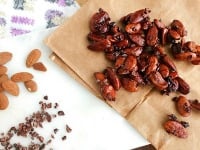




What about tru coco?
You need to contact them and see – but at first glance I know they are not organic – could be from concentrate and heat pasteurized.
Thoughts on Zola Coconut water?
What about Rising Sun young thai coconut water? (red can)
FoodBabe,
Thanks
for all the great info! …Keep on doing the right THANG!
Thanks
Larry Vega
How does Sprouts brand Coconut water compare? Love this!!
Curious about Blue Monkey! Thanks!
What do you know about Mira Azul coconut water?
Hi there! I noticed the Silk and Blue Diamond brands introduced an almond milk/coconut milk blend. According to your article, I assume the coconut milk comes from mature coconuts and this new blend is really not any more nutritious with the coconut added. How would we go about finding out whether or not these brands are using sustainable processes?
Thx for the post. We’ve been getting VERY serious about our foods. When working out in the heat (or health issues that bring about the need for electrolytes) we don’t drink Gatorade (of course). So I learned about coconut water. We love it, but I hadn’t sent the time to really research them…well, you did it for me. THANK YOU! Lol! We also eat sardines and they give a great amy of potassium/electrolytes with our good Omegas. Took me a month, yes a month of research to find out that there is no comparison on how well the body uses the actual whole fish soooooo much better than the pills…No matter how high end the fish oil pill. The protein of the fish helps the body absorb the oils.
By the way, I don’t know how I stumbled upon you and your page, but I LOVE it. Thank you so much providing such informative articles.
I love this product and it is locally distributed here in Charleston! They even offer the option of pulp. Tastes great and they use the ‘retort’ process which uses high pressure and high temperature for only a short period of time. How about it?
http://www.risingsundrink.com
Hi Food Babe,
Thanks so much for this report !!!!! A while back I wrote to you asking to investigate the coconut water companies due to sneakiness that I was experiencing. I very much appreciate you providing this report ~ I feel like my request was heard ~ even though this may have been on your list anyway. Many thanks for all that you do, all that you are and all that your provide. Love, Catalina
I definitely keep all requests on the ongoing list! This took a while to do and appreciate your patience! 🙂
Do you know about Invo? The bottle says raw and I know they use HPP. They say non GMO but I don’t know about organic. I found it at Whole Foods next to Harmless Harvest.
Also, THANK YOU for all you do for us!
Very detailed article. Thanks!! Just a heads up, Whole Foods does two types of packaging. One in the can, and a liter size which comes in a carton, which I drink myself. And I do believe they are different. Not 100% on that. Keep rocking!!
Any thoughts on Kimbo?
I’m totally lost at this point I drink
CO but they all sound bad 🙁
Discouraged
In canada from Costco i purchase the brand ” sun tropics “. Its says not from concentrate, no added sugars, packaged in Thailand, coconut water only ingredient listed, how do they fare in your opinion?
I was wondering the same.. did you ever hear back?
Unfortunately there has been no response to that question Michelle.
Have you heard of the Central Market brand coconut water? The label says it is not from concentrate, comes from young Brazilian coconuts (single estate), and is not pasteurized. No organic label, so it obviously isn’t organic.
Thanks for all you do!
I’m wondering the same thing! That’s the one I buy. Thanks 🙂
Do you know anything about “Koh Coconut”?
What about KOH brand. Product of Thailand
100% pure coconut water
right from the coconut
no preservatives
Not from concentrate
Hi Christy, KOH is in Costco again this March! I work for KOH. You are buying a very good product and I can say this because I am involved from farm to shipping. I work directly with our farmers, all nine of them. Vani has written an excellent article and I am impressed. At KOH we fill and produce immediately after cutting so we don’t need to add any presevatives. Our bottling facility is only an hour + from the farms. KOH uses Thailand’s Amphawa river young coconuts which are very sweet naturally so no need to add sugar no flavor like the other big guys. KOH is good to GO. Please enjoy. Thank you! Brett
Also, we use the flash pastuerization UHT but that was because I rejected HPP option for both expense and health concerns (pink bottles= bacteria) and the can is sterilized truly denuding all nutritive value.
PS: Let me know if you have any questions. I’m here.
Thoughts on Evolution juice? They sell them at some Whole Foods and some starbucks’ locations (I know, I know). It is coconut water and pineapple juice (don’t think they make straight coconut water), so it has more sugar, but no added sugar or ingredients besides coconut water and pineapple juice. It is cold pressed and tastes very ‘fresh’, like Harmless Harvest.
I love Harmless Harvest too:)
I’m happy to hear you are enjoying our organic coconut water Chelsea!
I’m so thankful that you posted this. I absolutely love coconut water and always wondered about all the various brands out there. Now we know! Thank you!
I’ve been drinking Sun Tropics. It doesn’t list as Organic but it says it’s not from concentrate and lists no other ingredients other than coconut water. It is a brand I can get at Costco in bulk.
Thanks for the info!
I too was wondering about Evolution brand from Starbucks. I have absolutely hated every coconut water but this one. Maybe my body was giving me a good reason to after reading this. Let us know about Evolution! 🙂
You are an inspiration, FoodBabe.
Please keep doing you because YOU are doing pretty well 🙂
Xoxo, huge fan of your work.
Thank you for doing this. Its about time for somebody to stand up against these big companies that don’t care about our health, but just how much money they are making.
The answer to discerning which brand to buy is none of the above..
BUY YOUR OWN LIVE COCONUTS 🙂
They taste 29382948 times better than any prepackaged processed beverage you can buy off the shelf..
If they are not accessible to you, just pass on the coconut water 🙂
Is BLUE MONKEY, with pulp. MMMMmmmmmmmm. So yummy.
Hi Foodbabe, not sure why you ding 365 from Whole Foods, they now use 33.8 FL OZ Tetra Pak not cans and they show Product of Thailand. Also as to C2O despite being canned it too is preservative free and thus to show ONE and Naked rated higher makes no sense whatsoever. I would rank C2O at the same level as Amy & Brian. I do in fact like your crusade and what you focus on. Another good choice that’s gaining significant market share is Anao from Brazil http://purebraziliancoconutwater.com/stores.php
I think you need to look deeper into the HPP process. I don’t believe it is as wholesome as you think. I practice muscle testing and nothing HPP’d ever tests well.
Eric, I have similar concerns about The HPP process. If you read the label on Harmless Harvest coconut water it indicates happily that the “bad bacteria” are killed by the HPP processing. There is no way you can distinguish between “bad” and “good or beneficial” bacteria. That’s why antibiotics can sometimes have a negative effect since they are good at doing whst they are asked to do, kill bacteria. They just go in an kill ALL the bacteria present. So, what is HPP really doing. Plus, if you are killing off bacteria, it seems likely that you are also destroying enzymes in the process. A better choice is to use an organic, frozen coconut water such as the one from Exotic Superfoods. It is a little more work and takes up freezer space, but tastes fantastic.
Hi Joel – We are so happy that people are questioning claims made by companies – ours included! For this reason we strive to be as transparent as possible. HPP is not a one-trick pony. The results vary widely depending on the temperature, product makeup, amount of time, and amount of pressure used. We would love to discuss the process further, and talk to you more about the affect high pressure processing has on pathogens versus bacteria versus enzymes, and what that all means for our coconut water.
Feel free to email us at [email protected].
Hi Eric – We would love to hear more about your testing! Mind sharing some of your results with us at [email protected]?
How do you do your muscle testing? Thanks. Sue
Hi Sue, I am a QRA (Quantum Reflex Analysis) practitioner trained by Premier Research Labs.
Hey Eric,
I know the Central Market brand is fortified with vitamin C. Food Babe says that’s a red flag that it’s highly processed. It also tastes weird!
Hi!
I’m so curious how Perfect Fit Coconut Powder stacks up against these brands? It says organic, but I’m assuming too processed since its powder?
Thanks!!
What??? I drink C2O with pulp! I give up! Might as well drink A Coke. @&$#%
Drinking coconut water from a fresh coconut is the best part of my trips to El Salvador. We pay one of the locals a couple of bucks and he climbs up the coconut trees @ my parents’ beach house, cuts them up, insert the straw and voila! Love it! Wish we could do the same here! In the meantime, in between trips, I will take your suggestions. Thanks for the research.
I have done some searching but am unable to find scientific studies which show the percentage of nutrients “killed” during any form of pasteurization. Could you please point me towards these studies?
THANKS!
I too am curious about the brand Sun Tropics.
Thanks!
Does anyone have a link to buy Vita Juice coconut water on amazon? I can’t find it =(
dang, my favorites are on the avoid at all costs list. 🙁 Well I guess it was too good to be true.
I guess I have to wait till I see someone selling them on the side of the road on the north shore. Lucky I live Hawaii! I’ll keep an eye out for those brands you recommend. I haven’t heard of them before.
Hey Vani,
This article reminded me of a sports drink on the market called BODYARMOR® Super Drink that has coconut water in it. The products slogan is “Upgrade your Sports Drink”. Have you heard of it? and is it Safe?
http://drinkbodyarmor.com
This is a good, well researched article. I am going to look around for more HPP products – I am seeing it more. One note that concerned me was your comment on cans. Aluminum cans are one of the lowest energy resources to recycle, and it can be recycled over and over again without being degraded – and we actually do recycle a lot of it. Take a look at Life Cycle Analysis research. I think it’s right up your alley. Here’s a pesentation from my former professor who is a leading researcher in the field: http://www.utexas.edu/research/ceer/esm282/dfe/LCAoverview.PDF
The “ultra high heat (pasteurization)” apparently didn’t make the shelf life long enough!!!…my experience with Zico ended with a nasty feeling in my mouth; which turned out to be a huge clump of white and green slimey grossness!
Thanks for investigating my favorite drink. I wrote to the Food Babe Army about my concerns regarding the chlorine content in coconut water. Waiting to hear the results.
Hi,
I was recently on holiday in the north of Australia where I was drinking fresh coconuts that were harvested from the palm trees along the beach and they tasted significantly less sweet than the fresh ones sold in the supermarket which are from thailand. When I mentioned this to my friend who lives in north Australia, he said there is a rumour that the ones in the supermarket are injected with sugar syrup. I don’t think this is possible (wouldn’t they go off?) and the difference would probably be due to different varieties, but I wondered if you would know or have heard anything about this??
Thai Heritage Coconut Water 100% natural
Hello,
What about Bai5 Molokai coconut?
Thanks in advance!
What about Harvest Bay coconut water? I know it’s not organic, but its Non-GMO and its not from concentrate.
Thanks,
Do you know which stores in the US, especially in the north east would carry the best ones in ur list. I have always stacked up Vita Coco from costco.
RAW Harmless Harvest is by far the best coconut water I have ever tasted!!!
I’m happy to hear you’re enjoying our raw & organic coconut water Michelle!
Yes.. I recommend RawHH Coconut Water to everyone I meet. As a brand ambassador for organic products; I really am into clean & green products 😉 thanks for making an awesome drink!!
Love it On tap at Whole Foods Danbury CT…
Coco Ridge my favorite.
Hi Food Babe,
I would really REALLY love to learn more about the ethical practices of these companies. This means fair labor, fair wages, deforestation, sensitivity to orangutan and elephant habitats, sensitivity to indigenous peoples, etc. I have tried to do my own research but have met many dead ends. If you can shed any light on these issues in relation to the coconut water market, I would be forever grateful.
Thank you for all that you do!
-Sarah
GREAT question Sarah Elizabeth!
At Harmless Harvest, we are in the Fair for Life certification process. The practices you write about are not just about good ethics to us, they pivotal to maintaining a sustainable business. So much so that we include them in our business model. Check out more about us here http://harmlessharvest.com/method and email us if you have any questions! [email protected]